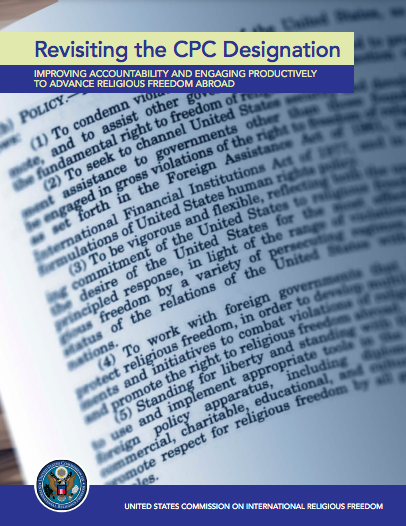A core component of U.S. international religious freedom policy is the designation of countries with particularly severe violations of religious freedom as a Country of Particular Concern (CPC).
Since the International Religious Freedom Act (IRFA) was passed in 1998, the United States has committed to evaluate every country around the world to identify those that have engaged in or tolerated egregious violations of religious freedom, and thus merit a CPC designation. Labeling a country as a CPC is intended to bring with it certain obligatory, commensurate, punitive measures.
Jeremy Barker, RFI Associate Vice President for International Strategies, and Ryan Zoellner, RFI research consultant, authored a report for the U.S. Commission on International Religious Freedom (USCIRF) regarding the CPC process across the past 25 years.
Barker and Zoellner’s report evaluates the effectiveness of the CPC process and makes recommendations to improve it amid broader U.S. efforts to advance international religious freedom. The report found that receiving a CPC designation typically prompted limited changes in the offending countries. Broad use of waivers and the application of pre-existing sanctions often undermined the positive effects that being named a CPC might otherwise have brought about. In fact, the report indicates that in more than 90% of CPC designations, the United States pursued these alternatives instead of consequential actions on CPCs. In some cases, the United States offered exemptions to CPCs where there was evidence that they were taking meaningful steps to improve their protections for religious freedom. When accounting for waivers, reliance on pre-existing sanctions, and exemptions for promising behavior, the United States applied explicit new penalties of any kind less than 5% of the time when it comes to CPC designations.
Barker, Zoellner, and RFI President David Trimble briefed USCIRF commissioners and professional staff ahead of the release of this report in July.
The report provides a list of recommendations to strengthen the effectiveness of the CPC process in creating measurable improvements in religious freedom abroad. Real engagement with CPC countries is key. Without some relationship, the United States has limited ability to press the country with sanctions or other diplomatic pressure. This was highlighted when the United States was unable to influence Eritrea upon its CPC designation in 2004. The country had very limited engagement with the United States before that time. In contrast, America’s relationship with Vietnam could provide a valuable model of how the CPC process could be used to create change in a foreign country. Vietnam and the United States reached an agreement in 2004 and 2005 in which the Vietnamese government made significant progress during those years, leading to the removal of Vietnam as a CPC in 2006. In this example, we find some evidence of how the United States can prompt meaningful change in the conditions of religious freedom in other countries without jeopardizing other U.S. interests.
An effective policy to advance religious freedom will require accountability and effective engagement not only from the offices specifically tasked with advancing religious freedom but also by leveraging their work across the whole of U.S. diplomatic efforts.
Severe religious freedom violations are taking place across the globe. Ensuring proper recognition and accountability as a CPC is the first step, including in places like Nigeria, as Trimble recently highlighted. However, what comes next is just as important if there is to be productive engagement with CPCs to advance religious freedom within them.
Read the full report: “Revisiting the CPC Designation: Improving Accountability and Engaging Productively to Advance Religious Freedom Abroad.”
THE RFI BLOG

Is Egypt’s Government Trying To Take Over Christianity’s Most Important Monastery?

Does Southeast Asia Lead the World in Human Flourishing?

RFI Leads Training Session on Religious Freedom Law and Policy for U.S. Army War College

Oral Argument in Charter School Case Highlights Unconstitutional Motives Behind OK Attorney General’s Establishment Clause Claim

Largest Longitudinal Study of Human Flourishing Ever Shows Religion’s Importance
CORNERSTONE FORUM

Reaffirming Religious Freedom: Bridging U.S. Advocacy and Iraq’s Constitutional Framework

Political Polarization, Same-Sex Marriage and Religious Liberty

Bridging the Gap Between International Efforts and Local Realities: Advancing Religious Freedom in the MENA Region

Challenges to Religious Freedom in Iraq and the Critical Need for Action


